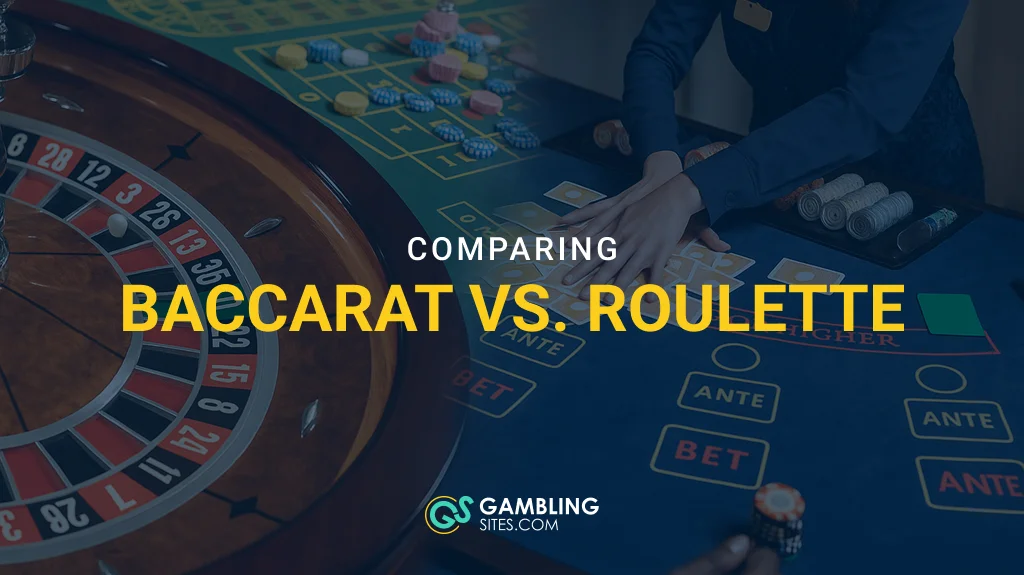Baccarat vs. Roulette — Comparing Odds, Rules, and Strategy

Baccarat vs. roulette is one of the most common debates players face when choosing a table game. Both sit at the heart of every casino, yet they work on entirely different rules, odds, and payouts. This guide takes a close look at how they compare, from house edge and strategy to online and live play. By the end, you’ll see exactly which game fits your playing style best.
Roulette vs Baccarat — A Quick Comparison Table
Deciding on baccarat or roulette really comes down to whether you want simple bets with steady odds or a wheel that offers every kind of gamble. Check out the following table for a quick comparison:
| Feature | Baccarat | Roulette |
|---|---|---|
| Learning Curve / Difficulty | Easy to learn: only banker, player, or tie bets | Easy to start, but bet types and odds take time to master |
| House Edge | 1.06% (banker), 1.24% (player), ~14.36% (tie) | 2.7% (European), 5.26% (American) |
| Max Payout | 8:1 on tie | 35:1 on single numbers |
| Strategy Depth | Minimal | Moderate |
| Game Speed | 10 seconds (RNG), 45-60 seconds (Live Dealer) | 12–15 seconds (RNG), 75-100 seconds (Live Dealer) |
| Player Choice | Limited: banker, player, tie | Wide: dozens of inside/outside bets |
| Popular Appeal | Favored by high-rollers for low edge | Universal draw, accessible for casual and experienced players alike |
Baccarat or Roulette — How the Rules Differ
Roulette and baccarat may sit side by side in the casino, but they operate on a completely different setup. One’s a wheel full of betting choices, while the other keeps it simple with banker, player, or tie.
Baccarat Rules — Player, Banker, and Tie Bets
Baccarat is all about comparing two dealt hands — Player and Banker — where totals are calculated differently than in other card games. Here are the core mechanics:
- Card Values: Cards 2 through 9 carry face value, tens and face cards count as zero, and aces count as one. Every total above 9 drops the first digit, so a 7 and an 8 equal 15, but in baccarat, it scores as 5.
- Dealing Mechanics: The dealer always deals two hands — one for the Player, one for the Banker. Each starts with two cards, and a third card may come in depending on specific rules. Everything happens automatically without any decisions from your end.
- Natural Win: If either hand totals 8 or 9 on the first two cards, it’s called a “natural,” and the round ends immediately. No third card is drawn, and the higher total wins.
- Third Card Rule: If the Player hand totals 0–5, it draws a third card; if it totals 6–7, it stands. The Banker’s draw depends on both its own total and the Player’s third card value. For example, Banker draws on 3 unless Player’s third card is an 8, or draws on 6 if Player’s third card is 6–7. The chart is set in stone and dealers follow it without exception.
- Betting Options: You can only wager on Player, Banker, or Tie. A winning Banker hand returns even money with 5% taken as commission, Player brings an even payout, while a Tie gives either 8:1 or 9:1, depending on the game variant.
- House Edge: Because of the third card rules and commission, the Banker bet carries the lowest house edge at 1.06%. The Player comes in at 1.24%, and Tie is far worse at about 14.36%.
Roulette Rules — European vs. American Wheels
Roulette operates on a numbered wheel and betting grid, but the type of wheel dictates the edge. Here’s how each version is set up:
Read more about American vs European roulette.
Baccarat vs Roulette Odds — Which Game Gives You Better Chances?
Comparing baccarat vs roulette odds shows baccarat gives you better chances, thanks to the Banker bet’s slim 1.06% edge. Roulette, even on a European wheel, takes more off every wager at 2.70%.
Baccarat Odds Explained (Lowest House Edge on Banker Bets)
Baccarat boils down to three choices, and the math behind them never shifts. The Banker bet wins slightly more often because of the third-card drawing rules. To balance that advantage, casinos take 5% commission from Banker payouts. Even with such a cut, Banker delivers the strongest odds in the entire game, sitting at 1.06% house edge.
Player bets run a bit higher at 1.24%, still among the best when looking at alternatives to roulette in US casinos. Betting on a tie looks attractive with payouts of 8:1 or 9:1, but the house edge soars over 14%.
Baccarat strategy is therefore straightforward: skip Tie, favor Banker, and treat Player as the only viable alternative when you want to change things up.
| Bet Type | Win Probability | Payout | House Edge |
|---|---|---|---|
| Banker | ~45.86% | 1:1 (minus 5% commission) | 1.06% |
| Player | ~44.62% | 1:1 | 1.24% |
| Tie (8:1) | ~9.52% | 8:1 | 14.36% |
| Tie (9:1) | ~9.52% | 9:1 | 4.85% |
Roulette Odds Explained (European vs. American Differences)
Every bet on a European wheel, from a single number to even money, carries the exact same 2.70% edge. That comes from the single green zero, which turns fair odds into slightly clipped payouts.
To better understand, take an even-money bet like red or black. There are 18 red numbers, 18 black, and one green zero. You win 18 times out of 37, but you’re still only paid 1:1. If that zero didn’t exist, the odds would balance perfectly.
Now, on an American wheel, there are 38 pockets because of the extra double zero. The math works the same way, but every outcome shifts slightly against you. A straight bet becomes 1 in 38, an even bet becomes 18 in 38, and so on. That single added slot nearly doubles the edge to 5.26%.
| Bet Type | Payout | Win Probability (European) | House Edge (European) | Win Probability (American) | House Edge (American) |
|---|---|---|---|---|---|
| Straight (1 number) | 35:1 | 1/37 (2.70%) | 2.70% | 1/38 (2.63%) | 5.26% |
| Even-Money (Red/Black, Odd/Even, High/Low) | 1:1 | 18/37 (48.65%) | 2.70% | 18/38 (47.37%) | 5.26% |
| Dozen/Column | 2:1 | 12/37 (32.43%) | 2.70% | 12/38 (31.58%) | 5.26% |
| Top Line (0, 00, 1, 2, 3) | 6:1 | N/A | N/A | 5/38 (13.16%) | 7.89% |
Baccarat vs Roulette Strategy — What Works Best?
When you weigh baccarat vs roulette strategy, both share the same core idea. Choose wagers and conditions that reduce the house edge, control volatility, and manage your bankroll around those decisions. Here’s how to apply that for each:
Simple Baccarat Strategy (Stick to Banker, Avoid Tie)
The best baccarat strategy from a mathematical standpoint is staking on Banker every round. That’s because the drawing rules tilt the math slightly in that direction and keep the house advantage at 1.06%. Player comes close at 1.24%, but over thousands of hands, that small difference adds up, which is why experienced gamblers never split evenly between the two.
What’s ultimately going to help you come out ahead, though, is how you approach the game itself. Keep your session goals short. Baccarat bleeds slowly compared with most games, so the closer you keep your exposure to the expected line, the higher the chance you’ll walk away ahead. Sitting down for hours chasing volume means you give the game time to let the math grind you down. Playing a few rounds, banking a profit target, and quitting makes variance work for you, not against you.
Roulette Betting Systems and Why to Be Cautious
The best roulette strategy begins before you even put money on the felt. No matter if you’re playing RNG roulette or on live dealer tables, choose the European wheel, not American. That single zero keeps the house edge at 2.70% instead of 5.26%. If you find La Partage or En Prison, even better, since those rules cut the edge on even-money wagers in half.
Once you’re seated, the strongest approach is to manage volatility by mixing outside bets. Red/Black, Odd/Even, and High/Low all cover eighteen numbers each, giving you nearly fifty percent hit frequency. By combining them with dozens or columns, you can create overlapping coverage that stretches across most of the grid. This doesn’t change the underlying math, but it reduces swings and gives you longer play (so more chances to win) for the same bankroll.
Roulette systems like Martingale, Fibonacci, or Labouchere can also be helpful. Again, neither of them alters the house edge. However, they take the guessing out of how to utilize your bankroll. The key is treating them as money management tools rather than miracle solutions. If you use one, set limits before you start, understand how quickly wagers can grow, and decide in advance when to walk away.
Playing Baccarat or Roulette Online and Live
Playing baccarat or roulette online gives you two distinct experiences: quick RNG games finishing in seconds, and live dealer tables that recreate the feel of a real casino. Both work well on mobile, though pace, atmosphere, and interaction differ by format.
| Feature | RNG (Online) | Live Dealer | Mobile Experience |
|---|---|---|---|
| Game Speed | Instant results in 10–15 seconds | Slower pace, 60–120 seconds per round | Both formats are optimized for quick loading |
| Atmosphere | Purely digital, no social interaction | Real dealers, authentic casino vibe | Streams scale to screen size, chat optional |
| Transparency | Results generated by certified RNG software | Outcomes shown in real time with cards or wheel | Clear interfaces, betting grids adapted for touch |
| Limits | Flexible stakes, often lower minimums | Higher minimums and maximums, VIP options | One-touch chip selection, easy bet placement |
| Availability | 24/7 with no waiting for seats | Limited tables (some with unlimited seats), VIP tables may be full at peak hours | A stable connection is needed for HD video quality |
FAQs About Baccarat vs. Roulette
Which has better odds: baccarat or roulette?
Odds in baccarat vs roulette favor baccarat, since Banker carries a 1.06% edge and Player 1.24%. European roulette holds at 2.70%, while American jumps to 5.26%, so baccarat consistently offers the stronger mathematical position.
Is roulette or baccarat easier for beginners?
Ease of play in roulette vs baccarat leans toward baccarat, since you only pick Banker, Player, or Tie, and the game carries on with fixed rules. Roulette demands learning multiple bet types, payouts, and wheel formats.
What’s the difference between baccarat odds vs roulette odds?
The difference between baccarat odds vs roulette odds comes down to house edge. Banker sits at 1.06% and Player at 1.24%, while European roulette locks every wager at 2.70% and American doubles it to 5.26%. Some French rules even cut even-money roulette bets to 1.35%.
Should I play roulette or baccarat if I want bigger wins?
Bigger wins come from roulette rather than baccarat. Straight-up numbers pay 35:1, splits 17:1, and corners 8:1, while baccarat tops out at 9:1 on Tie. A single $10 chip on one number in roulette can return $350 instantly.
Can you win more money in baccarat or roulette?
Whether you win more money in baccarat or roulette depends on luck as well as your approach to the game. Roulette delivers higher single-spin payouts through inside bets, with straight numbers paying 35:1 and splits 17:1. Baccarat’s lower house edge instead gives players more consistent returns across longer sessions.
Conclusion: Should You Play Baccarat or Roulette?
Baccarat and roulette stand as two of the most popular casino classics. Baccarat is the better choice for players who value steady odds and straightforward strategy. Roulette appeals to thrill-seekers, thanks to its wide mix of bets and the potential for huge single-spin payouts, especially on straight numbers. For online play, both work brilliantly in RNG format for quick sessions. Live dealer tables, on the other hand, deliver a realistic feel with dealers and authentic cards and wheels.
Take a look at the best roulette casinos or the top baccarat online casinos to see which truly matches your style.
 80%
80% 75%
75%
